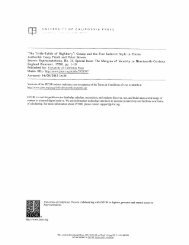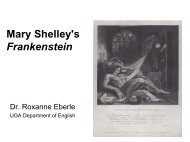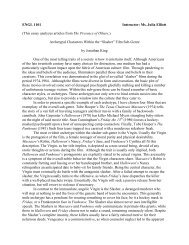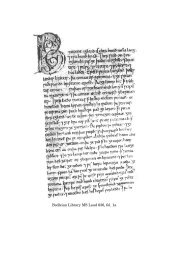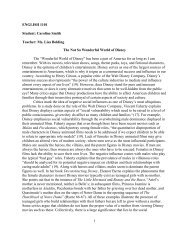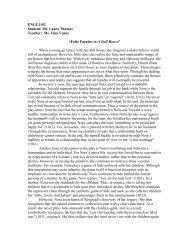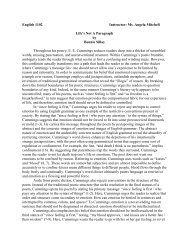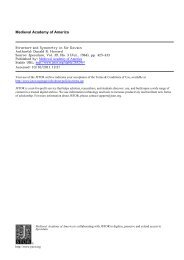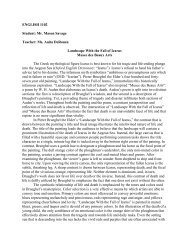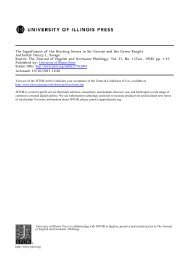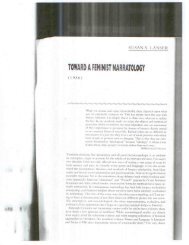An Analysis of the Temptation Scenes in - Department of English
An Analysis of the Temptation Scenes in - Department of English
An Analysis of the Temptation Scenes in - Department of English
Create successful ePaper yourself
Turn your PDF publications into a flip-book with our unique Google optimized e-Paper software.
<strong>An</strong> <strong>An</strong>alysis <strong>of</strong> <strong>the</strong> <strong>Temptation</strong> <strong>Scenes</strong> <strong>in</strong> "Sir Gawa<strong>in</strong> and <strong>the</strong> Green Knight"<br />
Author(s): David Mills<br />
Source: The Journal <strong>of</strong> <strong>English</strong> and Germanic Philology, Vol. 67, No. 4 (Oct., 1968), pp. 612-<br />
630<br />
Published by: University <strong>of</strong> Ill<strong>in</strong>ois Press<br />
Stable URL: http://www.jstor.org/stable/27705604 .<br />
Accessed: 10/10/2011 12:24<br />
Your use <strong>of</strong> <strong>the</strong> JSTOR archive <strong>in</strong>dicates your acceptance <strong>of</strong> <strong>the</strong> Terms & Conditions <strong>of</strong> Use, available at .<br />
http://www.jstor.org/page/<strong>in</strong>fo/about/policies/terms.jsp<br />
JSTOR is a not-for-pr<strong>of</strong>it service that helps scholars, researchers, and students discover, use, and build upon a wide range <strong>of</strong><br />
content <strong>in</strong> a trusted digital archive. We use <strong>in</strong>formation technology and tools to <strong>in</strong>crease productivity and facilitate new forms<br />
<strong>of</strong> scholarship. For more <strong>in</strong>formation about JSTOR, please contact support@jstor.org.<br />
http://www.jstor.org<br />
University <strong>of</strong> Ill<strong>in</strong>ois Press is collaborat<strong>in</strong>g with JSTOR to digitize, preserve and extend access to The Journal<br />
<strong>of</strong> <strong>English</strong> and Germanic Philology.
AN ANALYSIS OF THE TEMPTATION SCENES IN<br />
SIR GAWAIN AND THE GREEN KNIGHT<br />
David Mills, University <strong>of</strong> Liverpool<br />
Sir Gawa<strong>in</strong> and <strong>the</strong> Green Knight has been <strong>the</strong> subject <strong>of</strong> many critical<br />
appreciations and <strong>in</strong>terpretations, most <strong>of</strong> which, at some po<strong>in</strong>t, seek<br />
to establish <strong>the</strong> exact nature <strong>of</strong> Gawa<strong>in</strong>'s temptations and lapse.1 The<br />
present article does not propose any new <strong>in</strong>terpretation <strong>of</strong> <strong>the</strong> tempta<br />
tion scenes.<br />
Ra<strong>the</strong>r, by<br />
a close exam<strong>in</strong>ation <strong>of</strong> <strong>the</strong> scenes, it seeks to<br />
account for <strong>the</strong> immediate effect <strong>of</strong> comedy and moral tension2 which<br />
<strong>the</strong> temptation dialogues produce, and to suggest new mean<strong>in</strong>gs for<br />
certa<strong>in</strong> passages with<strong>in</strong> <strong>the</strong>ir contexts.<br />
Each day's dialogue depends for its effect upon <strong>the</strong> creation <strong>of</strong> a<br />
particular k<strong>in</strong>d <strong>of</strong> tension. On each day <strong>the</strong> Lady makes statements<br />
which would be acceptable <strong>in</strong> a certa<strong>in</strong> type <strong>of</strong> situation but which<br />
are not applicable to <strong>the</strong> situation <strong>in</strong> which Gawa<strong>in</strong> f<strong>in</strong>ds himself.<br />
By vary<strong>in</strong>g <strong>the</strong> k<strong>in</strong>d <strong>of</strong> conflict <strong>in</strong>volved from day to day, <strong>the</strong> poet<br />
conveys a sense <strong>of</strong> climax which is <strong>of</strong>fset by Gawa<strong>in</strong>'s f<strong>in</strong>al lapse.<br />
The effect <strong>of</strong> <strong>the</strong> first day's dialogue is predom<strong>in</strong>antly comic and<br />
depends upon <strong>the</strong> fact that conventional words and <strong>the</strong>mes from social<br />
and chivalric contexts acquire sexual significance when employed <strong>in</strong><br />
<strong>the</strong> context <strong>of</strong> <strong>the</strong> bedroom. Thus <strong>the</strong> detailed account <strong>of</strong> <strong>the</strong> Lady's<br />
stealthy entry <strong>in</strong>to Gawa<strong>in</strong>'s room and <strong>of</strong> Gawa<strong>in</strong>'s reaction is essen<br />
1<br />
Some idea <strong>of</strong> <strong>the</strong> variety <strong>of</strong> approaches may be ga<strong>in</strong>ed from M. W. Bloomfield,<br />
"Sir Gawa<strong>in</strong> and <strong>the</strong> Green Knight: <strong>An</strong> Appraisal," PMLA, lxxvi<br />
(1961), 7-19. Among<br />
<strong>the</strong> more important <strong>in</strong>terpretations <strong>of</strong> Gawa<strong>in</strong> may be noted: L. D. Benson, Art and<br />
Tradition <strong>in</strong> Sir Gawa<strong>in</strong> and <strong>the</strong> Green Knight (New Brunswick, 1965); J. A. Burrow, A<br />
Read<strong>in</strong>g <strong>of</strong> Sir Gawa<strong>in</strong> and <strong>the</strong> Green Knight (London, 1965); G. J. Engelhardt, "The<br />
Predicament <strong>of</strong> Gawa<strong>in</strong>," MLQ, xvi<br />
(1955), 218-25; G. V. Smi<strong>the</strong>rs, "What Sir Gawa<strong>in</strong><br />
and <strong>the</strong> Green Knight Is About," MM, xxx<strong>in</strong><br />
(1963), 171-89; A. C. Spear<strong>in</strong>g, uSir<br />
Gawa<strong>in</strong> and <strong>the</strong> Green Knight" <strong>in</strong> Criticism and Medieval Poetry (London, 1964), pp. 29<br />
45<br />
2<br />
The critics mentioned <strong>in</strong> n. 1 <strong>in</strong>clude <strong>the</strong> humorous,<br />
or<br />
comic, or<br />
"good-natured"<br />
element <strong>in</strong> <strong>the</strong> poem <strong>in</strong> <strong>the</strong>ir <strong>in</strong>terpretations. Comedy <strong>in</strong> <strong>the</strong> poem also forms part <strong>of</strong> <strong>the</strong><br />
discussions by S. Bercovitch, "Romance and <strong>An</strong>ti-Romance <strong>in</strong> Sir Gawa<strong>in</strong> and <strong>the</strong><br />
Green Knight,11 PQ, xliv (1965), 30-37; R. H. Bowers, "Gawa<strong>in</strong> and <strong>the</strong> Green Knight<br />
as<br />
Enterta<strong>in</strong>ment," MLQ, xxrv<br />
(1963), 333-41; D. R. Howard, "Structure and Symmetry<br />
<strong>in</strong> Sir Gawa<strong>in</strong>,11 Speculum, xxxix (1964), 425-33. The<br />
start<strong>in</strong>g-po<strong>in</strong>t for <strong>the</strong> present ar<br />
ticle is Burrow's assertion that <strong>in</strong> <strong>the</strong> temptation<br />
<strong>in</strong>g through,<br />
or at least close to,<br />
scenes <strong>the</strong> poem "is at this po<strong>in</strong>t<br />
mov<br />
fabliau country" (p. 75).<br />
6l2
Sir Gawa<strong>in</strong> and <strong>the</strong> Green Knight 613<br />
tial to <strong>the</strong> appreciation <strong>of</strong> <strong>the</strong> dialogue. Gawa<strong>in</strong>'s <strong>in</strong>nocent specula<br />
tions on <strong>the</strong> significance <strong>of</strong> <strong>the</strong> Lady's entry set <strong>the</strong> tone for what is to<br />
come, for his <strong>in</strong>nocence serves to amuse <strong>the</strong> reader by emphasis<strong>in</strong>g<br />
just how little doubt <strong>the</strong>re can be about <strong>the</strong> Lady's <strong>in</strong>tentions under<br />
such circumstances.<br />
Here,<br />
as<br />
throughout<br />
<strong>the</strong> scene, <strong>the</strong><br />
comedy<br />
is<br />
more <strong>in</strong> evidence than <strong>the</strong> moral issue. Even Gawa<strong>in</strong>'s reaction on his<br />
feigned awaken<strong>in</strong>g, cross<strong>in</strong>g himself as bi his sa^e pe<br />
sauer to wor<strong>the</strong><br />
(1. 1202),3<br />
is a gesture<br />
<strong>of</strong> comic<br />
surprise<br />
ra<strong>the</strong>r than a serious rem<strong>in</strong>der<br />
<strong>of</strong> moral<br />
danger.<br />
The Lady cont<strong>in</strong>ues this mood with a conscious humour which is<br />
<strong>in</strong>dicated <strong>in</strong> terms such as lavande (1. 1207), gay (1. 1208), and bourde^<br />
(1. 1212). Her<br />
pected way:<br />
open<strong>in</strong>g<br />
words present <strong>the</strong> situation <strong>in</strong> a most unex<br />
"God moroun, Sir Gawayn," sayde J>at gay lady,<br />
"5e<br />
ar a<br />
sleper vnsly3e, J>at<br />
mon may slyde hider;<br />
Now ar 3e tan<br />
astyt!<br />
Bot true vus may schape,<br />
I schal bynde yow <strong>in</strong> your bedde, J>at be 3e tray st."<br />
(11. 1208-11)<br />
Responsibility for <strong>the</strong> situation is immediately laid upon <strong>the</strong> helpless<br />
and unwill<strong>in</strong>g Gawa<strong>in</strong>, seen here as a<br />
sleep<strong>in</strong>g sentry. The <strong>in</strong>appropri<br />
ateness <strong>of</strong> <strong>the</strong> martial image<br />
to Gawa<strong>in</strong>'s position as guest is itself<br />
Gawa<strong>in</strong> is<br />
comic, but it is made more so by <strong>the</strong> bedroom sett<strong>in</strong>g.<br />
vnslyie?not "unwary" but "<strong>in</strong>nocent," a fact confirmed by his earlier<br />
meditations on <strong>the</strong> Lady's purpose. The mascul<strong>in</strong>e associations raised<br />
by <strong>the</strong> impersonal mon are comically <strong>in</strong>appropriate, and <strong>the</strong> true<br />
vus <strong>in</strong> this context suggest love and not treaties <strong>of</strong> war. Bynde, with<br />
its idea <strong>of</strong> imprisonment, likewise acquires physical and sexual over<br />
tones which are reasserted by <strong>in</strong> your bedde. The result is a heighten<br />
<strong>in</strong>g <strong>of</strong> <strong>the</strong> sexual <strong>the</strong>me by <strong>the</strong> use <strong>of</strong> oblique reference. It also <strong>in</strong>volves<br />
an <strong>in</strong>version <strong>of</strong> <strong>the</strong> normal roles <strong>of</strong> knight and lady <strong>in</strong> <strong>the</strong> manner <strong>of</strong><br />
<strong>the</strong> fabliau, for <strong>the</strong> Lady not only assumes <strong>the</strong> dom<strong>in</strong>ant role <strong>in</strong> <strong>the</strong><br />
action but also def<strong>in</strong>es her position <strong>in</strong> imagery appropriate to knightly<br />
conquest.4<br />
3 All quotations are from Sir Gawa<strong>in</strong> and <strong>the</strong> Green Knight, ed. E. V. Gordon and<br />
J. R. R. Tolkien, rev. ed. (Oxford, 1930). Italics, where used, are my<br />
own. For a different<br />
<strong>in</strong>terpretation <strong>of</strong> <strong>the</strong> effect <strong>of</strong> this l<strong>in</strong>e, see B. S. Levy, "Gawa<strong>in</strong>'s Spiritual Journey:<br />
Imitatio Christi <strong>in</strong> Sir Gawa<strong>in</strong> and <strong>the</strong> Green Knight11 Duquesne Studies, <strong>An</strong>nuale Medi<br />
aevale, vi<br />
(1965), 65-106. Levy states: "Nor is Gawa<strong>in</strong> unaware <strong>of</strong> his vulnerability, for<br />
at <strong>the</strong> first approach <strong>of</strong> <strong>the</strong> lady, who attempts to distract him from his basic concern for<br />
his spiritual welfare, he carefully<br />
4<br />
On <strong>the</strong> <strong>in</strong>version <strong>of</strong> roles<br />
blesses himself<br />
and <strong>the</strong> Lady's<br />
to assure <strong>the</strong> safety <strong>of</strong> his soul" (p. 96).<br />
knowledge <strong>of</strong> courtly love,<br />
see<br />
J. F.<br />
Kiteley, "The De Arte Honeste Amandi <strong>of</strong> <strong>An</strong>dreas Capellanus and <strong>the</strong> Concept <strong>of</strong><br />
Courtesy <strong>in</strong> Sir Gawa<strong>in</strong> and <strong>the</strong> Green Knight,11 <strong>An</strong>glia,<br />
lxxix (1961), 7-16.
614<br />
Mills<br />
Gawa<strong>in</strong> is understandably ill at ease. Gawayn pe blype (1. 1213) is<br />
an unexpected and significant departure from <strong>the</strong> usual Gawa<strong>in</strong><br />
epi<strong>the</strong>t<br />
<strong>of</strong><br />
god<br />
or some<br />
near-synonym.6<br />
His<br />
reply represents<br />
an<br />
attempt<br />
to susta<strong>in</strong> <strong>the</strong> jest<strong>in</strong>g manner (bourded a$ayn with mony a blype latter,<br />
1. 1217) and cont<strong>in</strong>ues <strong>the</strong> Lady's martial image <strong>in</strong> terms such as<br />
leide (1. 1215), grace (1. 1215), and prysoun (1. 1219). However, <strong>the</strong><br />
speech excludes <strong>the</strong> sexual implications <strong>of</strong> <strong>the</strong> orig<strong>in</strong>al image. Grace<br />
cannot be considered as <strong>the</strong> grace <strong>of</strong><br />
courtly love, for Gawa<strong>in</strong> ex<br />
pressly asks to bo}e <strong>of</strong> pis bed, and busk me better (1220).<br />
request, word-play<br />
is abandoned:<br />
With this<br />
I schulde keuer )?e more comfort to karp yow wyth. (1. 1221)<br />
Gawa<strong>in</strong> is request<strong>in</strong>g<br />
a social context <strong>in</strong> which he can converse with<br />
<strong>the</strong> Lady. His words echo <strong>the</strong> account <strong>of</strong> his conversation with <strong>the</strong><br />
Lady<br />
on <strong>the</strong> previous even<strong>in</strong>g:<br />
Bot 3et I wot t>at Wawen and ]?e wale b?rde<br />
Such comfort <strong>of</strong> her compaynye ca3ten togeder<br />
. . .<br />
Wyth clene cortays carp closed fro iy\]>e. (11. 1010-13)<br />
These words, however, are also echoed by Bercilak <strong>in</strong> his address to<br />
Gawa<strong>in</strong> with a<br />
significantly different emphasis which excludes <strong>the</strong><br />
reference to conversation; he speaks <strong>of</strong> his wife who<br />
wyth yow schal sitte // and comfort yow with compayny<br />
(11. 1098-99)<br />
The Lady's reply is not merely<br />
a<br />
rejection <strong>of</strong> Gawa<strong>in</strong>'s request. It<br />
takes up Gawa<strong>in</strong>'s desire for polite conversation <strong>in</strong> a social context<br />
and <strong>in</strong>vests it with <strong>the</strong> very significance which Gawa<strong>in</strong> has sought to<br />
5<br />
For example, gode Gawan (1. 109), fie goode knytf (1. 381), fie gode knytf (1. 482),<br />
Gawan wat) for gode knawen (1. 633), fie god mon (1. 1179) ; compare later references, such<br />
as so<br />
god<br />
as<br />
Gawayn (1. 1297) and gode Gawayn (1. 2214). Where a nonalliterat<strong>in</strong>g epi<strong>the</strong>t<br />
is used, it is <strong>of</strong>ten a near-synonym ioxgode?e.g., hende, 1. 405, or noble, 1. 2149. The form<br />
god <strong>in</strong> its various syntactic and semantic functions, toge<strong>the</strong>r with its derivatives, is <strong>in</strong><br />
frequent collocation with Gawa<strong>in</strong> <strong>in</strong> <strong>the</strong> alliterative l<strong>in</strong>e; e.g.,<br />
Sir Gauan,<br />
on<br />
Godej halue (1. 692)<br />
"In god fayth," quo)? Gawayn (1. 1241)<br />
<strong>An</strong>d al go?% <strong>in</strong> gomen Gawayn<br />
he called (1. 1376)<br />
So here:<br />
uGoud moroun, gay," quo}? Gawayn J?e bly]?e.<br />
The collocation, however, serves to rem<strong>in</strong>d us <strong>of</strong> Gawa<strong>in</strong>'s usual epi<strong>the</strong>t and emphasises<br />
that blype is not a nonalliterative variant for gode but is a variant <strong>of</strong> <strong>the</strong> epi<strong>the</strong>t applied<br />
to <strong>the</strong> Lady, gay. On <strong>the</strong> importance <strong>of</strong> collocation for a<br />
<strong>the</strong>ory <strong>of</strong> formulaic poetry,<br />
see<br />
R. Quirk, "Poetic Language and Old <strong>English</strong> Metre," <strong>in</strong> Early <strong>English</strong> and Norse<br />
Studies, ed. A. Brown and P. Foote (London, 1963), pp. 150-71.
Sir Gawa<strong>in</strong> and <strong>the</strong> Green Knight 615<br />
exclude, while at <strong>the</strong> same time cont<strong>in</strong>u<strong>in</strong>g <strong>the</strong> effect <strong>of</strong> comic <strong>in</strong><br />
version. A new determ<strong>in</strong>ation is seen <strong>in</strong> her words?je schal not rise<br />
(1. 1223), / schal happe (1. 1224). Happe reasserts <strong>the</strong> idea orig<strong>in</strong>ally<br />
conveyed <strong>in</strong> bynde and leads back aga<strong>in</strong> to <strong>the</strong> image <strong>of</strong> martial cap<br />
ture <strong>in</strong> my kny?t pat I ka?t haue (1. 1225). Gawa<strong>in</strong> must serve, not<br />
freely and will<strong>in</strong>gly,<br />
as a<br />
knight<br />
serves a<br />
lady, but under compulsion,<br />
as a<br />
prisoner submits to his captor. Aga<strong>in</strong> <strong>the</strong>re is an <strong>in</strong>version <strong>of</strong><br />
roles and an assertion <strong>of</strong> sexual service by implication; but now <strong>the</strong><br />
sexual implications<br />
are carried over even to Gawa<strong>in</strong>'s harp, which <strong>the</strong><br />
Lady sees as <strong>the</strong> sequel to her completed embrace:<br />
I schal happe yow here Jmt ol>er half als,<br />
<strong>An</strong>d sypen karp wyth my kny3t J>at I ka3t haue ....<br />
(11. 1224-25)<br />
The Lady's attack now takes a new form. The proposed embrace<br />
is motivated by Gawa<strong>in</strong>'s reputation (For I wene wel, iwysse, Sir<br />
Wowen ?e are, 1.<br />
1226),<br />
a<br />
reputation<br />
for honour,<br />
an abstract concept,<br />
and hendelayk,<br />
a<br />
compound whose second element, suggestive <strong>of</strong><br />
action,<br />
can also bear amorous<br />
significance.6<br />
Your<br />
honour, your hende<br />
layk (1. 1228) is balanced <strong>in</strong> <strong>the</strong> next l<strong>in</strong>e by with lorde$, wyth lady es<br />
(1. 1229), imply<strong>in</strong>g honour for lords and hendelayk for ladies. This<br />
slight sexual suggestion is now<br />
developed <strong>in</strong> an<br />
<strong>in</strong>creas<strong>in</strong>gly out<br />
spoken manner. The Lady rem<strong>in</strong>ds Gawa<strong>in</strong> that <strong>the</strong>y are completely<br />
alone. The ra<strong>the</strong>r weak hendely pray sed (1. 1228) is <strong>the</strong>n taken up <strong>in</strong><br />
<strong>the</strong> somewhat stronger hym pat al lyke) (1. 1234), which ga<strong>in</strong>s added<br />
force from <strong>the</strong> Lady's references to <strong>the</strong> bedroom sett<strong>in</strong>g. The Lady,<br />
however, hav<strong>in</strong>g asserted that we bot oure one (1. 1230), goes on <strong>in</strong> more<br />
general terms?/ haue <strong>in</strong> pis hous (1. 1234). The l<strong>in</strong>e<br />
I schal ware my whyle wel, quyl hit laste3 (1. 1235)<br />
with its suggestion <strong>of</strong> a play upon whyle (time) and wyle (cunn<strong>in</strong>g,<br />
stratagem), leads to <strong>the</strong> emphatic bob with tale (1236). By present<strong>in</strong>g<br />
<strong>the</strong> bedroom sett<strong>in</strong>g<br />
as a social context <strong>in</strong> which Gawa<strong>in</strong> can demon<br />
strate his ambiguous hendelayk, <strong>the</strong> Lady <strong>in</strong>vests <strong>the</strong> social karp with<br />
hidden mean<strong>in</strong>g which emerges <strong>in</strong> <strong>the</strong> play upon tale, evok<strong>in</strong>g strong<br />
physical and sexual associations characteristic <strong>of</strong> <strong>the</strong> fabliau, al<br />
6 Ostensibly hendelayk repeats <strong>the</strong> idea conta<strong>in</strong>ed <strong>in</strong> <strong>the</strong> preced<strong>in</strong>g honour and is so<br />
presented <strong>in</strong> editorial glosses. Layk, however, is a word <strong>in</strong>dicative <strong>of</strong> activity <strong>in</strong> Middle<br />
<strong>English</strong> (see NED) and <strong>the</strong> real dist<strong>in</strong>ction is between a<br />
quality (honour) and a form <strong>of</strong><br />
conduct (hendelayk). The fact that layk can be used <strong>of</strong> amorous play<br />
assumes added<br />
significance <strong>in</strong> <strong>the</strong> context <strong>of</strong> <strong>the</strong> Lady's argument.
6i6 Mills<br />
though here capable also <strong>of</strong> bear<strong>in</strong>g <strong>in</strong>nocuous social mean<strong>in</strong>g.7 The<br />
Lady <strong>the</strong>n carries her concept <strong>of</strong> social duty <strong>in</strong> <strong>the</strong> bedroom sett<strong>in</strong>g to<br />
its startl<strong>in</strong>g conclusion:<br />
5e ar welcum to my cors,<br />
Yowre awen won to wale,<br />
Me behoue3 <strong>of</strong> fyne force<br />
Your seruaunt be, and schale. (11. 1237-40)<br />
The sexual reference <strong>of</strong> this passage is so blatant that it has caused<br />
difficulty to certa<strong>in</strong> critics.8 In context, however, it also follows from<br />
<strong>the</strong> social references. The earlier association <strong>of</strong> oure one and pis hous<br />
is taken up <strong>in</strong> a play<br />
on <strong>the</strong> words cor(t)s and won. The Lady plays<br />
upon cors (body) and cor(t)s (courts),9 and upon won<br />
(delight) and<br />
won<br />
(dwell<strong>in</strong>g). The physical<br />
sense is clear; on a social level <strong>the</strong> pas<br />
sage would mean: "You are welcome to my courts, to choose your<br />
own<br />
dwell<strong>in</strong>g." As hostess, <strong>the</strong> Lady must be Gawa<strong>in</strong>'s seruaunt, and <strong>of</strong><br />
fyne force would refer to <strong>the</strong> social duties imposed upon her by her<br />
lord which she must fulfil (and schale). Yet, <strong>in</strong> <strong>the</strong> bedroom sett<strong>in</strong>g <strong>of</strong><br />
fyne force<br />
seems an allusion to Gawa<strong>in</strong>'s helplessness, recall<strong>in</strong>g <strong>the</strong><br />
7 Tail (OE t g?) and tale (OE talu) would not be formally identical <strong>in</strong> a West Mid<br />
lands dialect, and <strong>in</strong> Gawa<strong>in</strong> <strong>the</strong>y are dist<strong>in</strong>guished <strong>in</strong> spell<strong>in</strong>g. In a Nor<strong>the</strong>rn dialect,<br />
however, <strong>the</strong>y would fall toge<strong>the</strong>r under tale-, see R. Jordan, Handbuch der mittelengli<br />
schen Grammatik: I. Lautlehre (Heidelberg, 1925), p. 123, par. 132, and <strong>the</strong> note by E. J.<br />
Dobson, <strong>English</strong> Pronunciation, 1500-1700: II. Phonology (Oxford, 1957), p. 778, n. 1.<br />
Nor<strong>the</strong>rn forms were known to <strong>the</strong> Gawa<strong>in</strong>-poet and employed particularly <strong>in</strong> rhyme<br />
words;<br />
see J. P. Oakden, Alliterative Poetry <strong>in</strong> Middle <strong>English</strong>: I. The Dialectal and<br />
Metrical Survey (Manchester, 1930), pp. 72-87.<br />
8<br />
The discussion has centred upon <strong>the</strong> Lady's character and motives;<br />
see P. Stone,<br />
Sir Gawa<strong>in</strong> and <strong>the</strong> Green Knight (London, 1959), p. 73, n. 1. Kiteley (p. 10) regards <strong>the</strong><br />
blatant <strong>of</strong>fer as a breach <strong>of</strong> <strong>the</strong> standards <strong>of</strong> courtly love which <strong>the</strong> Lady o<strong>the</strong>rwise ob<br />
serves. Benson (p. 50) sees <strong>the</strong> Lady "flaunt<strong>in</strong>g her disregard <strong>of</strong> <strong>the</strong> courtly code" <strong>in</strong> <strong>the</strong><br />
manner <strong>of</strong> a fabliau hero<strong>in</strong>e. Only Burrow (pp. 81-82) suggests that <strong>the</strong> speech may have<br />
a double mean<strong>in</strong>g: "In Middle <strong>English</strong> my (your, his) corse<br />
than me<br />
.<br />
(you, him).<br />
. . There is, <strong>the</strong>n,<br />
(body) could mean no more<br />
a sav<strong>in</strong>g ambiguity about <strong>the</strong> Lady's <strong>of</strong>fer. She<br />
can claim to have said no more than she says <strong>in</strong> <strong>the</strong> follow<strong>in</strong>g l<strong>in</strong>e: T am at your ser<br />
vice.' " Burrow quotes T. F. Mustanoja, A Middle <strong>English</strong> Syntax: Part I (Hels<strong>in</strong>ki,<br />
i960), pp. 148-49. This passage suggests that <strong>the</strong> use <strong>of</strong> his own body is "an emphatic<br />
equivalent <strong>of</strong> himself11 when employed <strong>in</strong> apposition to a personal pronoun, and oc<br />
casionally occurs <strong>in</strong> isolation mean<strong>in</strong>g he himself. Even allow<strong>in</strong>g for <strong>the</strong> possibility <strong>of</strong> an<br />
emphatic and unusual form <strong>in</strong> Gawa<strong>in</strong>, <strong>the</strong> result<strong>in</strong>g mean<strong>in</strong>g, "You are welcome to me,<br />
to take your own delight," is unambiguous. The example which Burrow quotes from<br />
Purity is not strictly parallel s<strong>in</strong>ce corse <strong>the</strong>re has <strong>the</strong> sense <strong>of</strong> person, which it cannot<br />
bear <strong>in</strong> Gawa<strong>in</strong>.<br />
9 The / <strong>of</strong> court was lost <strong>in</strong> fifteenth-century French, and it is reasonable to suppose<br />
that it was weak among French speakers (<strong>in</strong>clud<strong>in</strong>g <strong>English</strong> speakers <strong>of</strong> French) <strong>in</strong> <strong>the</strong><br />
later fourteenth century. In any case, <strong>the</strong> / is weaker <strong>in</strong> <strong>the</strong> plural form ond force-cor (fis<br />
would be an acceptable, if not a perfect, rhyme.
Sir Gawa<strong>in</strong> and <strong>the</strong> Green Knight 617<br />
capture-image <strong>of</strong> katf, while schale is <strong>the</strong> most emphatic form <strong>of</strong> <strong>the</strong><br />
earlier schal's.10 The idea <strong>of</strong> compulsion conveyed <strong>in</strong> force and schale<br />
is at odds with <strong>the</strong> idea <strong>of</strong> service. Conventional social conduct is<br />
overthrown, and conventional social term<strong>in</strong>ology has become <strong>in</strong><br />
vested with sexual significance. The Lady will serve Gawa<strong>in</strong>, because<br />
she can<br />
compel<br />
Gawa<strong>in</strong> to serve her.<br />
Gawa<strong>in</strong> smiles acquiescence (gayn hit me pynkke$, 1. 1241), but as<br />
before refuses to<br />
accept <strong>the</strong> Lady's sexual,<br />
as<br />
opposed<br />
to<br />
social, claims.<br />
Reuerence refers only to <strong>the</strong> Lady's attitude, and Gawa<strong>in</strong>'s claims to<br />
fame, sexual or o<strong>the</strong>rwise, are disclaimed by wy$e vnworpy. The<br />
sexual implications <strong>of</strong> tale and seruaunt are replaced by a conventional<br />
concept <strong>of</strong> knightly service:<br />
At sa3e oJ>er at seruyce J?at I sette my3t<br />
To ]?e plesaunce <strong>of</strong> your prys?hit<br />
were a pure ioye<br />
(11. 1246-47)<br />
where sa$e and seruyce cannot bear <strong>the</strong> sexual <strong>in</strong>nuendoes <strong>of</strong> <strong>the</strong><br />
Lady's words and a pure ioye suggests that <strong>the</strong> Lady's <strong>of</strong>fer does not<br />
fall with<strong>in</strong> <strong>the</strong> category <strong>of</strong> purity. Gawa<strong>in</strong> is seek<strong>in</strong>g <strong>the</strong> dom<strong>in</strong>ant<br />
role, and <strong>in</strong> so do<strong>in</strong>g voices <strong>the</strong> Lady's praise, as a true knight should.<br />
The Lady aga<strong>in</strong> restores <strong>the</strong> sexual implication to Gawa<strong>in</strong>'s words.<br />
Gawa<strong>in</strong>'s term, prys, is taken up with reference to him <strong>in</strong> an ambigu<br />
ous phrase:<br />
J)e prys and ]>e prowes J?at plese3 al o)?er (1. 1249)<br />
where prys and prowes become a restatement <strong>of</strong> honour and hendelayk,<br />
just as plese1) al oper is a fur<strong>the</strong>r advance on al lyke^. Social duty is<br />
stated <strong>in</strong> daynt? and <strong>the</strong> pattern <strong>of</strong> dwell<strong>in</strong>g terms is completed by<br />
<strong>in</strong> h?r holde (1. 1252), mean<strong>in</strong>g "stronghold" (hous, cors, won), "power"<br />
(ka?t), and "physical hold, embrace" (bynde, happe) and thus fus<strong>in</strong>g<br />
<strong>the</strong> earlier images: as I pe habbe here (1. 1252) cont<strong>in</strong>ues <strong>the</strong> fusion.<br />
Hence <strong>the</strong> l<strong>in</strong>es<br />
To daly with derely your daynt? worde3,<br />
Keuer hem comfort and colen her care3 (11. 1253-54)<br />
not only echo Gawa<strong>in</strong>'s keuer pe more comfort but make it clear that<br />
this concept <strong>of</strong> comfort is possible only if Gawa<strong>in</strong> rema<strong>in</strong>s <strong>in</strong> his bed,<br />
while <strong>the</strong> suggestion <strong>of</strong> <strong>the</strong> language <strong>of</strong> courtly love <strong>in</strong> colen her care}<br />
cont<strong>in</strong>ues <strong>the</strong> sexual <strong>in</strong>nuendo. The Lady concludes:<br />
10 Schale is an unusual choice for rhymed, stressed position;<br />
long a is <strong>in</strong>dicated by spell<strong>in</strong>g and required by rhyme.<br />
an emphatic, full-grade
6i8 Mills<br />
Bot I louue ]?at ilke lorde ]?at J>e lyfte halde3<br />
I haf hit holly <strong>in</strong> my honde )>at al desyres,<br />
Jmr3e grace. (11. 1256-58)<br />
On a sexual level, <strong>the</strong>se l<strong>in</strong>es cont<strong>in</strong>ue <strong>the</strong> image-patterns already<br />
established. . . .<br />
Haf <strong>in</strong> my honde is a restatement <strong>of</strong> . . .<br />
haf <strong>in</strong> hor<br />
holde, ano<strong>the</strong>r manifestation <strong>of</strong> <strong>the</strong> <strong>the</strong>me <strong>of</strong> capture, while al desyres<br />
is <strong>the</strong> culm<strong>in</strong>ation <strong>of</strong> <strong>the</strong> earlier lyke? and plese?. The Lady seems to<br />
be thank<strong>in</strong>g God for putt<strong>in</strong>g Gawa<strong>in</strong> <strong>in</strong> a compromis<strong>in</strong>g position,11<br />
although hit is not <strong>the</strong> pronoun we should expect to f<strong>in</strong>d used <strong>of</strong><br />
Gawa<strong>in</strong>; it reduces him from a human-be<strong>in</strong>g to an object <strong>of</strong> desire, a<br />
shift <strong>of</strong> emphasis which is part <strong>of</strong> <strong>the</strong> preparation for <strong>the</strong> barter<br />
imagery to come. Socially, however, <strong>the</strong> Lady's words seem only to<br />
re-echo what Bercilak's courtiers said <strong>of</strong> Gawa<strong>in</strong>:<br />
God hat3 geuen vus his grace godly for so}>e,<br />
pat such a<br />
gest<br />
as Gawan graunte3 vus to haue.<br />
(11. 920-21)<br />
It is <strong>the</strong> k<strong>in</strong>d <strong>of</strong> remark which a hostess might use <strong>of</strong> an honoured<br />
guest.<br />
Gawa<strong>in</strong>, now7 pe myry mon (1. 1263), returns to his familiar argu<br />
ment, although his expression becomes so compressed that editors feel<br />
required to suggest translations <strong>in</strong> <strong>the</strong> notes.12 The Lady's daynt?, at<br />
a social level, is disclaimed as be<strong>in</strong>g <strong>of</strong> disproportionate value for his<br />
disert, and this fact itself is taken as <strong>in</strong>dicative <strong>of</strong> <strong>the</strong> Lady's fraunchis<br />
(1. 1264), her "nobility <strong>of</strong> character" (MED 2a) on a social level. The<br />
reader, however, may be aware that<br />
j>-aunchis<br />
has a second sense, also<br />
applicable, <strong>of</strong> "freedom <strong>of</strong> action, freedom to do as one pleases"<br />
(MED id) which can hardly qualify for Gawa<strong>in</strong>'s epi<strong>the</strong>t <strong>of</strong> nobele.<br />
Gawa<strong>in</strong>, however, has merely suggested ano<strong>the</strong>r approach to <strong>the</strong><br />
11 With<strong>in</strong> <strong>the</strong> fabliau, <strong>of</strong> course, <strong>the</strong> grace <strong>of</strong> God could be <strong>in</strong>voked for all types <strong>of</strong><br />
sexual demands; cf. <strong>the</strong> Wife <strong>of</strong> Bath:<br />
and Jhesu Crist us sende<br />
Housbondes meeke, yonge, and fressh abedde,<br />
<strong>An</strong>d grace t'overbyde hem that we wedde.<br />
(Rob<strong>in</strong>son edition, p. 88, 11. 1258-60)<br />
The Lady, however, cannot make such unambiguous statements, and <strong>the</strong> reference <strong>of</strong><br />
hit is <strong>the</strong>refore open to discussion.<br />
12 The sense <strong>of</strong> <strong>the</strong> passage is clear but <strong>the</strong>re are several unresolved problems. The<br />
exact mean<strong>in</strong>g <strong>of</strong> fongen hor dede) (1. 1265) and nysen (1. 1266) is not clear. Equally<br />
difficult is <strong>the</strong> syntax <strong>of</strong> 1. 1265 and <strong>the</strong> reference <strong>of</strong> hit <strong>in</strong> 1267. While much <strong>of</strong> our diffi<br />
culty arises from our limited knowledge <strong>of</strong> Middle <strong>English</strong> vocabulary and usage, it is<br />
possible that <strong>the</strong> ambiguous hit may conceal a flaw <strong>in</strong> Gawa<strong>in</strong>'s logical arguments. See<br />
notes on this passage <strong>in</strong> Tolkien and Gordon, and <strong>in</strong> Sir Gawa<strong>in</strong> and <strong>the</strong> Green Knight,<br />
ed. Sir I. Gollancz with <strong>in</strong>troductory essays by M. S. Serjeantson and M. Day, EETS<br />
(London, 1940).
Sir Gawa<strong>in</strong> and <strong>the</strong> Green Knight 619<br />
Lady, by his use <strong>of</strong> <strong>the</strong> term fraunchis. The Lady takes up <strong>the</strong> idea <strong>of</strong><br />
"freedom <strong>of</strong> action" and startl<strong>in</strong>gly fuses it with a new sense <strong>of</strong> <strong>the</strong><br />
term "<strong>the</strong> right to buy<br />
or sell, also <strong>the</strong> right to exclude o<strong>the</strong>rs from<br />
buy<strong>in</strong>g<br />
or<br />
sell<strong>in</strong>g;<br />
a<br />
monopoly" (MED 3b). What she seeks is a free<br />
dom <strong>of</strong> action which confers upon her a<br />
monopoly <strong>of</strong> <strong>the</strong> male market.<br />
As Burrow has po<strong>in</strong>ted out,13 this comb<strong>in</strong>ation <strong>of</strong> barter and sex is<br />
commonplace <strong>in</strong> <strong>the</strong> fabliau, but its appearance here is carefully pre<br />
pared. The image pattern started with Gawa<strong>in</strong>'s prys at 1. 1247 and<br />
cont<strong>in</strong>ues (retrospectively) through prys (1. 1249), set at ly$t (1. 1250),<br />
daynt? (1. 1250, hav<strong>in</strong>g<br />
a second sense <strong>of</strong> "precious th<strong>in</strong>g"), <strong>the</strong> equa<br />
tion <strong>of</strong> Gawa<strong>in</strong>'s presence with much <strong>of</strong> pe garysoun oper golde (1. 1255),<br />
through Gawa<strong>in</strong>'s own fraunchis (1264) and daynt? (1266) used with<br />
<strong>the</strong> surpris<strong>in</strong>gly materialistic verb, delen. The Lady herself seems to<br />
look back to her previous speech, for al pe wele <strong>of</strong> peworlde<br />
were <strong>in</strong> my<br />
honde (1. 1270) recalls haf hit holly <strong>in</strong> my honde. Her worth (1. 1269) is<br />
presented <strong>in</strong> material terms?wone (1. 1269, NED "riches"), wele (1.<br />
1270), chepen (1. 1271)?and even Gawa<strong>in</strong>'s costes (1. 1272) <strong>in</strong>volves<br />
a play upon "qualities" (ON *kostr) and "costly th<strong>in</strong>gs" (OF cost,<br />
NED 4). Indeed, <strong>the</strong>se "costly th<strong>in</strong>gs" are displayed for all to see?<br />
bewt?, debonert?, blype semblaunt (1. 1272)?and are re<strong>in</strong>forced by those<br />
unspecified aspects <strong>of</strong> Gawa<strong>in</strong>'s reputation <strong>of</strong> which <strong>the</strong> Lady has<br />
heard.<br />
At last Gawa<strong>in</strong> sees his chance. Bercilak is <strong>the</strong> "better buy" de<br />
spite <strong>the</strong> high prys attached to Gawa<strong>in</strong>. The reference to Bercilak is<br />
a rem<strong>in</strong>der to <strong>the</strong> Lady <strong>of</strong> her role as wife and hostess. Gawa<strong>in</strong>, as her<br />
husband's guest, is her seruaunt (1. 1278) ; but he seeks also to be her<br />
servant as a vassal serves his lady?hence she is my souerayn (1. 1278)<br />
and he is yowre kny?t (1. 1279)<br />
as a faithful servant and not as a help<br />
less<br />
captive. Souerayn<br />
marks <strong>the</strong> culm<strong>in</strong>ation <strong>of</strong> Gawa<strong>in</strong>'s<br />
praise<br />
<strong>of</strong><br />
<strong>the</strong> Lady, s<strong>in</strong>ce she excels him <strong>in</strong> worth and is <strong>the</strong>refore a fit match for<br />
Bercilak. The sexual <strong>in</strong>nuendoes have been successfully elim<strong>in</strong>ated by<br />
rem<strong>in</strong>d<strong>in</strong>g <strong>the</strong> Lady <strong>of</strong> her duty as wife and <strong>of</strong> Gawa<strong>in</strong>'s duty as knight<br />
and guest. The chivalric concept <strong>of</strong> service is restored.<br />
Yet it is restored <strong>in</strong> unchivalric fashion:<br />
<strong>An</strong>d, soberly your seruaunt, my souerayn I holde yow,<br />
<strong>An</strong>d yowre kny3t I<br />
becom,<br />
and Kryst yow fo^elde.<br />
(11. 1278-79)<br />
13 Burrow, pp. 76-77: "an idea much more characteristic <strong>of</strong> fabliau than romance?<br />
<strong>the</strong> 'mercantile' idea <strong>of</strong> sexual favours as a commodity to be exchanged aga<strong>in</strong>st o<strong>the</strong>r<br />
commodities or cash." Burrow does not, however, press this po<strong>in</strong>t <strong>in</strong> <strong>in</strong>terpret<strong>in</strong>g <strong>the</strong><br />
scene; he merely asks <strong>the</strong> reader to notice specially <strong>the</strong> play on pris (p. 83).
?2o Mills<br />
This sequence <strong>of</strong> short phrases, l<strong>in</strong>ked by conjunctions, sounds terse<br />
and hurried, especially when compared with Gawa<strong>in</strong>'s long, and <strong>of</strong>ten<br />
<strong>in</strong>volved speeches. A sense <strong>of</strong> impatience is evident <strong>in</strong> <strong>the</strong> Lady's<br />
grow<strong>in</strong>g despair and Gawa<strong>in</strong>'s irritation. I th<strong>in</strong>k we would be entitled<br />
to understand this <strong>in</strong> <strong>the</strong> l<strong>in</strong>es<br />
pe lady J?enn spek <strong>of</strong> leue,<br />
He granted hir ful son? (11. 1288-89)<br />
which suggest that both contestants th<strong>in</strong>k <strong>the</strong> round is at an end.<br />
The grow<strong>in</strong>g impatience expla<strong>in</strong>s <strong>the</strong> coda to <strong>the</strong> scene. The Lady<br />
abruptly changes <strong>the</strong> tone, from wyth a glent la$ed (1. 1290) to ful stor<br />
worde] (1. 1291):<br />
Now he ]?at spede3 vche speche Jris disport 3elde yow !<br />
Bot J?at 3e be Gawan, hit got3 <strong>in</strong> mynde. (11. 1292-93)<br />
The first l<strong>in</strong>e is an expansion <strong>of</strong> Gawa<strong>in</strong>'s Kryst yow for^elde <strong>in</strong> which<br />
disport ("amusement") seems bitter and ironic, while <strong>the</strong> second, with<br />
its defective alliteration, achieves a terseness equivalent to Gawa<strong>in</strong>'s<br />
previous speech, culm<strong>in</strong>at<strong>in</strong>g <strong>in</strong> <strong>the</strong> blunt, colloquial hit got$ <strong>in</strong><br />
mynde. Gawa<strong>in</strong> himself is startled?his Querfore? (1. 1294) is very<br />
direct, and asked freschly. The Lady attempts to restore <strong>the</strong> mood<br />
with blessed, revert<strong>in</strong>g to her extended sentence-structure <strong>in</strong> praise <strong>of</strong><br />
Gawa<strong>in</strong>.<br />
The Lady aga<strong>in</strong> asserts a normal social context with<strong>in</strong> which, <strong>in</strong><br />
normal courteous fashion, <strong>the</strong> knight could seek a kiss from a lady.<br />
The bedroom presents a different context. Gawa<strong>in</strong>'s Iwysse, worpe as<br />
yow lykei (1. 1302) is weary ra<strong>the</strong>r than courteous. He seems to treat<br />
kiss<strong>in</strong>g as an obligation <strong>of</strong> a vassal and carefully deprives <strong>the</strong> act,<br />
not only <strong>of</strong> personal volition (at your comaundement, 1. 1303), but also<br />
<strong>of</strong> personality, for lest he displese yow (1. 1304) is an oblique form <strong>of</strong><br />
self-reference. Yet Gawa<strong>in</strong> has once more been<br />
compelled<br />
to concede<br />
some <strong>of</strong> <strong>the</strong> dom<strong>in</strong>ance to <strong>the</strong> Lady and has re<strong>in</strong>troduced comedy <strong>in</strong><br />
his implied sentiment that to kiss when <strong>the</strong> Lady commands befalls<br />
a knight <strong>in</strong> <strong>the</strong> course <strong>of</strong> duty.<br />
The tension <strong>of</strong> <strong>the</strong> scene breaks <strong>in</strong> a rapid sequence <strong>of</strong> movements.<br />
The Lady advances with unseemly haste?comes, caches (1. 1305),<br />
toutei, kisse) (1. 1306). The action pauses with momentary courtesy<br />
(comly by kennen, 1. 1307) and <strong>the</strong> Lady departs without even a verb<br />
<strong>of</strong> motion (dos hir forth, 1. 1308). Now it is Gawa<strong>in</strong>'s turn to produce a<br />
sudden burst <strong>of</strong> energy?ryches, ryse, rapes (1. 1309), clepes, choses (1.<br />
1310), bo?e} (1. 1311), meued (1. 1312). The action is <strong>the</strong> result <strong>of</strong> <strong>the</strong>
Sir Gawa<strong>in</strong> and <strong>the</strong> Green Knight<br />
tension built up dur<strong>in</strong>g <strong>the</strong> <strong>in</strong>creas<strong>in</strong>gly complex word-play and <strong>the</strong><br />
grow<strong>in</strong>g impatience <strong>of</strong> <strong>the</strong> two protagonists which ultimately de<br />
stroys <strong>the</strong> elaborate and calculated discourse.<br />
Yet throughout <strong>the</strong> dialogue <strong>the</strong> sense <strong>of</strong> moral danger is never<br />
strong. It is <strong>the</strong> technique <strong>of</strong> <strong>the</strong> discourse, <strong>the</strong> comedy <strong>of</strong> <strong>the</strong> double<br />
mean<strong>in</strong>g, which gives <strong>the</strong> scene its appeal. Gawa<strong>in</strong>, <strong>in</strong>deed, shows no<br />
<strong>in</strong>terest <strong>in</strong> <strong>the</strong> Lady and her <strong>of</strong>fer, and <strong>the</strong>re is no evidence to suggest<br />
that his moral faculties are <strong>in</strong> any way tested. Here, as <strong>in</strong> o<strong>the</strong>r<br />
scenes, <strong>the</strong> poet gives a clue to <strong>the</strong> hero's thoughts. In l<strong>in</strong>es 1284-87<br />
it is suggested that Gawa<strong>in</strong>'s apparent <strong>in</strong>difference results from a con<br />
cern with <strong>the</strong> blow which he must receive at <strong>the</strong> Green Chapel. The<br />
physical temptations which <strong>the</strong> Lady <strong>of</strong>fers to Gawa<strong>in</strong> are <strong>of</strong> m<strong>in</strong>or<br />
concern compared with <strong>the</strong> real object <strong>of</strong> his quest, and <strong>the</strong> fact that<br />
her departure follows immediately upon this revelation stresses <strong>the</strong><br />
futility <strong>of</strong> her efforts. The comedy <strong>of</strong> <strong>the</strong> first day's dialogue is a<br />
counterpart to <strong>the</strong> absence <strong>of</strong> any evident moral conflict <strong>in</strong> <strong>the</strong> hero's<br />
m<strong>in</strong>d.<br />
The comedy <strong>of</strong> <strong>the</strong> first day is thus a prelude to more serious con<br />
flicts. On <strong>the</strong> second day <strong>the</strong> purely physical temptation is abandoned<br />
for a more serious social issue. At <strong>the</strong> same time <strong>the</strong>re is a transition<br />
from<br />
word-play<br />
to direct statement and argument and a<br />
correspond<br />
<strong>in</strong>g loss <strong>of</strong> comic <strong>in</strong>terest. The comic tension <strong>of</strong> <strong>the</strong> use <strong>of</strong> social and<br />
even commercial language <strong>in</strong> a bedroom context gives way to a differ<br />
ent tension, between <strong>the</strong> way <strong>in</strong> which knights<br />
are said to act <strong>in</strong><br />
courtly romances and <strong>the</strong> way <strong>in</strong> which Gawa<strong>in</strong> is act<strong>in</strong>g. Here <strong>the</strong><br />
Lady's remarks have to be evaluated with<strong>in</strong> <strong>the</strong> context <strong>of</strong> Gawa<strong>in</strong>'s<br />
quest for <strong>the</strong> Green Chapel and <strong>the</strong>refore become an<br />
important part<br />
<strong>of</strong> his moral concerns. At <strong>the</strong> same time <strong>the</strong> notion <strong>of</strong> duty and <strong>of</strong><br />
knightly service stressed by Gawa<strong>in</strong> on <strong>the</strong> first day <strong>in</strong> defence is ex<br />
tended by <strong>the</strong> Lady to comprehend courtly love.<br />
Just as <strong>the</strong> Lady's argument develops from <strong>the</strong> position <strong>of</strong> <strong>the</strong><br />
previous day, so <strong>the</strong> scene beg<strong>in</strong>s as if <strong>the</strong> word-play is to cont<strong>in</strong>ue.<br />
<strong>An</strong> expectation <strong>of</strong> comedy is raised by <strong>the</strong> l<strong>in</strong>es:<br />
pe lady no3t f?cate,<br />
Com to<br />
hym<br />
to<br />
salue;<br />
Ful erly ho wat3 hym ate<br />
His mode for to remwe<br />
(11. 1472-75)<br />
where <strong>the</strong> solicitous care <strong>of</strong> no)t formate and <strong>the</strong> conventional greet<strong>in</strong>g<br />
<strong>of</strong> salue stand <strong>in</strong> comic contrast to <strong>the</strong> purposeful colloquial wat) hym<br />
ate.<br />
621
?2 2 Mills<br />
The open<strong>in</strong>g speeches<br />
serve <strong>the</strong> double purpose <strong>of</strong> renew<strong>in</strong>g <strong>the</strong><br />
temptation and rectify<strong>in</strong>g <strong>the</strong> lapse <strong>of</strong> tone which occurred at <strong>the</strong> end<br />
<strong>of</strong> <strong>the</strong> previous day. The Lady's <strong>the</strong>me is aga<strong>in</strong> <strong>the</strong> duty <strong>of</strong> a courteous<br />
knight to kiss a lady, but <strong>the</strong> expression is now deferential. Wyth<br />
a<br />
luflych loke (1. 1480) replaces <strong>the</strong> backward glance <strong>of</strong> <strong>the</strong> previous day<br />
and <strong>the</strong> speech opens with a deferential Sir (1. 1481). The and bitter<br />
colloquial<br />
Bot J?at 3e be Gawan, hit got3 <strong>in</strong> mynde<br />
now becomes <strong>the</strong> restra<strong>in</strong>ed and polite<br />
Sir, 3if 3e be Wawen, wonder me<br />
J)ynkke3. (1. 1481)<br />
There is even perhaps<br />
an excuse for <strong>the</strong> previous day's bluntness <strong>in</strong><br />
<strong>the</strong> reference to alder-truest token <strong>of</strong> talk pat I cowpe (1. i486), as if it<br />
had been motivated by an urge for clarity.<br />
Gawa<strong>in</strong> himself shows a more courteous manner.<br />
Worpe<br />
lyke? is not repeated; although Gawa<strong>in</strong> cannot accept <strong>the</strong> Lady's<br />
suggestions, he never<strong>the</strong>less praises her remarks (good is your speche,<br />
1. 1498), and, although still repeat<strong>in</strong>g his ra<strong>the</strong>r ridiculous suggestion<br />
<strong>of</strong> <strong>the</strong> previous day, his answer is carefully constructed <strong>in</strong> half-l<strong>in</strong>e<br />
periods:<br />
I am at your comaundement,<br />
to kysse quen yow lyke3,<br />
5 e may lach quen yow lyst, and leue quen yow J?ynkke3,<br />
<strong>in</strong> space. (11. 1501-03)<br />
No impatience is here betrayed. The kiss itself is effected without <strong>the</strong><br />
<strong>in</strong>decent haste and close embrace <strong>of</strong> <strong>the</strong> previous day. The Lady merely<br />
toute $ adoun (1. 1504) and comlyly kysses (1. 1505), where <strong>the</strong> adverb<br />
suggests that this is a<br />
dignified kiss <strong>of</strong> salutation. The contrast <strong>in</strong><br />
manner with <strong>the</strong> previous day both provides<br />
a comic anti-climax and<br />
also sets <strong>the</strong> new tone for <strong>the</strong> dignified and serious dialogue which<br />
follows.<br />
In effect, <strong>the</strong> Lady beg<strong>in</strong>s with <strong>the</strong> same social-sexual reference as<br />
before, but moves to an argument which is entirely social. Her open<br />
<strong>in</strong>g criticism is that Gawa<strong>in</strong>, noted for courtesy, does not know how<br />
to undertake <strong>of</strong> compaynye pe coste$ (1. 1483). Compaynye here has<br />
two senses, social and sexual: M ED 1, "a group <strong>of</strong> persons hav<strong>in</strong>g<br />
a<br />
common<br />
<strong>in</strong>terest, purpose, faith, status, occupation, function,"<br />
and<br />
M ED 4, "companionship<br />
or <strong>in</strong>timacy between <strong>the</strong> sexes; sexual<br />
union." The two mean<strong>in</strong>gs<br />
are comically <strong>in</strong>compatible. The Lady,<br />
<strong>of</strong>fer<strong>in</strong>g ostensible social <strong>in</strong>struction, is herself contraven<strong>in</strong>g social<br />
as<br />
yow
Sir Gawa<strong>in</strong> and <strong>the</strong> Green Knight 623<br />
convention <strong>in</strong> be<strong>in</strong>g <strong>in</strong> Gawa<strong>in</strong>'s room, and Gawa<strong>in</strong>, <strong>the</strong> epitome <strong>of</strong><br />
courtesy, needs no social <strong>in</strong>struction. If mon kennes yow (1. 1484) aga<strong>in</strong><br />
exploits <strong>the</strong> <strong>in</strong>congruous mascul<strong>in</strong>e associations <strong>of</strong> <strong>the</strong> impersonal<br />
and, <strong>in</strong> look<strong>in</strong>g back to <strong>the</strong> previous day's dialogue, serves to rem<strong>in</strong>d<br />
<strong>the</strong> reader that <strong>the</strong> Lady's speech<br />
on that occasion scarcely conformed<br />
to polite usage and that its content was far more<br />
suggestive <strong>of</strong> sexual<br />
than social embrace.<br />
The rema<strong>in</strong>der <strong>of</strong> <strong>the</strong> Lady's speech has caused some concern to<br />
critics who see it as a<br />
barely concealed <strong>in</strong>vitation to rape. To appre<br />
ciate it, <strong>the</strong> reader should recall what happened when Gawa<strong>in</strong> did<br />
undertake <strong>the</strong> coste $ <strong>of</strong> compaynye:<br />
When Gawayn gly3t on J?at gay, ])at graciously loked,<br />
Wyth leue la)t <strong>of</strong> pe<br />
lor<br />
de, he went hem a3aynes...<br />
pe<br />
.<br />
loueloker he lappe3 a lyttel <strong>in</strong> arme3. (11. 970-74)<br />
The Lady suggests <strong>in</strong> <strong>the</strong> temptation that it is Gawa<strong>in</strong>'s duty:<br />
Quere-so countenaunce is couJ>e quikly<br />
to clayme. (1. 1490)<br />
Countenaunce here comb<strong>in</strong>es <strong>the</strong> ideas <strong>of</strong> "face" and "demeanour,"<br />
suggest<strong>in</strong>g recognition <strong>of</strong> both appearance and disposition. With<strong>in</strong><br />
a social context Gawa<strong>in</strong> recognised pat gay as Bercilak's wife and also<br />
recognised her favourable demeanour?pat graciously loked. Hence he<br />
claymed, <strong>in</strong> <strong>the</strong> sense <strong>of</strong> "put forward a claim," to make himself<br />
known to her. In <strong>the</strong> bedroom, <strong>the</strong> Lady's will<strong>in</strong>gness to be kissed is<br />
evident and Gawa<strong>in</strong> should clayme, <strong>in</strong> <strong>the</strong> sense <strong>of</strong> "demand as his<br />
due."<br />
and<br />
Gawa<strong>in</strong> rejects this suggestion, elim<strong>in</strong>at<strong>in</strong>g <strong>the</strong> sexual implications<br />
concentrat<strong>in</strong>g upon <strong>the</strong> social sense:<br />
If I were werned, I were wrang, iwysse, 3if<br />
I pr<strong>of</strong>ered.<br />
(1. 1494)<br />
If <strong>the</strong> Lady's disposition is known <strong>in</strong> a social context, <strong>the</strong>n she will<br />
not werne Gawa<strong>in</strong>; but courtesy demands that Gawa<strong>in</strong> must ask her<br />
husband's permission. This consent is clearly a social formality. To<br />
refuse it would be vilanous (1. 1497), and <strong>in</strong> any case Gawa<strong>in</strong> is a<br />
sufficiently capable knight to avenge <strong>the</strong> <strong>in</strong>sult (to constrayne wyth<br />
strenkpe, 1. 1496). With<strong>in</strong> <strong>the</strong> bedroom sett<strong>in</strong>g, however, <strong>the</strong> husband's<br />
consent is an irrelevance. The Lady's desire is known; she will not<br />
refuse Gawa<strong>in</strong> for she is teach<strong>in</strong>g him cortaysy, which implies <strong>the</strong><br />
opposite<br />
<strong>of</strong> vilanous. Moreover,<br />
a woman who does not act <strong>in</strong> courtly
6 24<br />
Mills<br />
fashion does not warrant courtly niceties. As G. J. Engelhardt has<br />
said, a knight could use force towards a woman <strong>of</strong> lower social rank,<br />
<strong>of</strong> vile<strong>in</strong> status.14<br />
Gawa<strong>in</strong> is thus rem<strong>in</strong>d<strong>in</strong>g <strong>the</strong> Lady once more that she is married,<br />
and he makes <strong>the</strong> po<strong>in</strong>t even clearer when he rejects <strong>the</strong> idea <strong>of</strong> force<br />
(pr?te is vnpryuande, 1. 1499) without specify<strong>in</strong>g whe<strong>the</strong>r he regards it<br />
as apply<strong>in</strong>g<br />
to Bercilak or to a woman <strong>of</strong> low social status. He <strong>the</strong>n<br />
goes<br />
on to refer to<br />
vche gift ]?at is geuen not with goud wylle.<br />
(1. 1500)<br />
This cannot refer to a gift from <strong>the</strong> Lady?a kiss would be bestowed<br />
will<strong>in</strong>gly. It refers to <strong>the</strong> gift by Bercilak <strong>of</strong> his wife to Gawa<strong>in</strong>, a gift<br />
unlikely to be given with good will and one which should not be ob<br />
ta<strong>in</strong>ed by force. Gawa<strong>in</strong>'s <strong>of</strong>fer to <strong>the</strong> Lady gives <strong>the</strong> l<strong>in</strong>es a f<strong>in</strong>al<br />
twist. The kiss which she claims from Gawa<strong>in</strong> is obta<strong>in</strong>ed under<br />
compell<strong>in</strong>g circumstances and can<br />
hardly be said to be bestowed with<br />
good will. Gawa<strong>in</strong>'s careful reply provides<br />
an<br />
implied judgement upon<br />
<strong>the</strong> Lady and makes it difficult for her to repeat her passionate<br />
em<br />
brace <strong>of</strong> <strong>the</strong> previous day.<br />
At this stage <strong>of</strong> <strong>the</strong> dialogue <strong>the</strong> sexual <strong>in</strong>nuendo <strong>of</strong> <strong>the</strong> word-play<br />
is abandoned for more serious discussion <strong>of</strong> pr<strong>in</strong>ciple. The Lady's<br />
approach is summed up <strong>in</strong> one speech <strong>of</strong> twenty-six l<strong>in</strong>es <strong>of</strong> a compli<br />
cated and ra<strong>the</strong>r loose structure, <strong>in</strong> which she tries to compare<br />
Gawa<strong>in</strong>'s conduct with that <strong>of</strong> <strong>the</strong> heroes <strong>of</strong> chivalric romance. The<br />
speech beg<strong>in</strong>s as if it were go<strong>in</strong>g to praise Gawa<strong>in</strong> (11. 1508-11), but<br />
it breaks <strong>of</strong>f abruptly for an apparent digression<br />
on <strong>the</strong> importance<br />
<strong>of</strong> love <strong>in</strong> <strong>the</strong> romances (11. 1512-19). Equally abruptly, <strong>the</strong> Lady<br />
returns to Gawa<strong>in</strong> and compares his conduct towards her with <strong>the</strong><br />
knightly behaviour <strong>of</strong> <strong>the</strong> romance heroes (11. 1520-27). The speech<br />
at this po<strong>in</strong>t is virtually<br />
one<br />
long sentence divided <strong>in</strong>to sections ellip<br />
tically by <strong>the</strong> omission <strong>of</strong> subord<strong>in</strong>ation. It achieves its effect by its<br />
dramatic changes <strong>of</strong> thought with<strong>in</strong> a cont<strong>in</strong>uous, develop<strong>in</strong>g <strong>the</strong>me.<br />
By contrast,<br />
a series <strong>of</strong> short sentences<br />
follows,<br />
made even more<br />
dramatic by sharp exclamations?Why! (1. 1528), For sch?me! (1.<br />
14 Engelhardt (p. 222, n. 8) suggests that <strong>the</strong> Lady's words orig<strong>in</strong>ate <strong>in</strong> <strong>An</strong>dreas'<br />
advice that it may be necessary to use force <strong>in</strong> mak<strong>in</strong>g love to a peasant?hence vilanous<br />
implies "<strong>of</strong> ville<strong>in</strong> status." D. W. Robertson, Jr. (A Preface to Chaucer [Pr<strong>in</strong>ceton,<br />
1963], pp. 443-44) po<strong>in</strong>ts out that force is recommended as part <strong>of</strong> <strong>the</strong> technique <strong>of</strong><br />
mak<strong>in</strong>g love to a peasant but "<strong>the</strong>re is noth<strong>in</strong>g <strong>in</strong> what he [<strong>An</strong>dreas] says that implies<br />
any k<strong>in</strong>d <strong>of</strong> license to rape peasants."
Sir Gawa<strong>in</strong> and <strong>the</strong> Green Knight 625<br />
1530), Dos (1. 1533)?and <strong>the</strong>- long periods give way to a series <strong>of</strong><br />
shorter sentences.<br />
The speech is far more elaborate than any on <strong>the</strong> previous day<br />
and far more serious <strong>in</strong> tone, develop<strong>in</strong>g an argument <strong>in</strong>stead <strong>of</strong> play<br />
<strong>in</strong>g upon words. Its content marks a reversal <strong>of</strong> <strong>the</strong> Lady's role, from<br />
teacher <strong>of</strong> etiquette<br />
to pupil <strong>in</strong> love,<br />
a role <strong>of</strong>ten adopted by <strong>the</strong><br />
knight.15 Hence <strong>the</strong> Lady presents herself as an <strong>in</strong>nocent. To her,<br />
Gawa<strong>in</strong>'s chivalry <strong>in</strong>volves two th<strong>in</strong>gs?sexual vitality (so $ong and<br />
so )epe, 1. 1510) and chivalric virtues (so cortayse, so knytfyly, 1. 1511).<br />
From cortayse and knytfyly spr<strong>in</strong>g <strong>the</strong> references to deeds <strong>of</strong> valour <strong>in</strong><br />
<strong>the</strong> romances; from ?ong and ?epe spr<strong>in</strong>g <strong>the</strong> references to pe lei layk<br />
<strong>of</strong>luf (1. 1513), her lele luf (1. 1516), her drury (1. 1517), voyded her care<br />
(1. 1518), and bro)t blysse <strong>in</strong>to boure with bountees hor awen (1. 1519).<br />
Here <strong>the</strong> context <strong>of</strong> evaluation is not <strong>the</strong> bedroom sett<strong>in</strong>g but<br />
Gawa<strong>in</strong>'s own quest, a quest not motivated by love. His dulful sloun<br />
de$ are not for drury (1. 1517) nor does it seem probable that he will<br />
ever return to court. Gawa<strong>in</strong>'s quest is not like those that <strong>the</strong> Lady<br />
describes, nor can his love for <strong>the</strong> Lady be like <strong>the</strong> loves <strong>of</strong> romances.<br />
Lel(e) to <strong>the</strong> Lady would <strong>in</strong>volve disloyalty to Bercilak. What <strong>the</strong><br />
Lady seeks is naturally not overtly stated. Her concept <strong>of</strong> love sug<br />
gests noth<strong>in</strong>g more than <strong>the</strong> luf-talkyng expected <strong>of</strong> Gawa<strong>in</strong> by <strong>the</strong><br />
reta<strong>in</strong>ers (1. 927) and fulfilled <strong>in</strong> <strong>the</strong> dere dalyaunce <strong>of</strong> his conversation<br />
with <strong>the</strong> Lady at <strong>the</strong> banquet (1. 1012). The verbal notion, <strong>in</strong>herent <strong>in</strong><br />
no<br />
worde$ / pat euer longed to luf (11. 1523-24) and dalyaunce to<br />
herken (1. 1529), gives way to more<br />
ambiguous terms?schewe and<br />
teche (11.1526-27), trweluf craftes (1.1527), sum game (1.1532)?and <strong>the</strong><br />
reference to Bercilak's absence both rejects Gawa<strong>in</strong>'s implicit re<br />
m<strong>in</strong>der and<br />
suggests<br />
far more than conversation. Her<br />
speech<br />
is a<br />
demand that Gawa<strong>in</strong> should treat her as a<br />
literary romance hero<br />
treats his lady, but <strong>the</strong> demand is given added force by <strong>the</strong> social<br />
criticisms which <strong>the</strong> Lady makes <strong>of</strong> Gawa<strong>in</strong>'s refusal. Ei<strong>the</strong>r he is<br />
lewed (1. 1528) and is <strong>the</strong>refore unworthy <strong>of</strong> his reputation;<br />
or he is<br />
<strong>in</strong>sult<strong>in</strong>g her by refus<strong>in</strong>g to regard her as <strong>the</strong> equal <strong>of</strong> <strong>the</strong> romance<br />
hero<strong>in</strong>e?<strong>in</strong> fact, consider<strong>in</strong>g her to dille (1. 1529).<br />
Gawa<strong>in</strong>'s reply is a<br />
masterpiece <strong>of</strong> rhetorical construction which<br />
refuses to accept <strong>the</strong> Lady's assumed role <strong>of</strong> <strong>in</strong>nocent pupil <strong>in</strong> love.<br />
He questions her attitude. She is "play<strong>in</strong>g" with him (play, 1. 1538).<br />
Her own countenaunce is coupe is echoed now <strong>in</strong> with anyskynne$<br />
countenaunce (1. 1539), suggest<strong>in</strong>g that <strong>the</strong> Lady's <strong>in</strong>tentions are far<br />
15 See Kitely, p. n.
626 Mills<br />
from clear. These suspicions are carefully hedged about with protesta<br />
tions <strong>of</strong> pleasure (gode gle, gomen, 1. 1536; ese, 1. 1539). Gawa<strong>in</strong> con<br />
t<strong>in</strong>ues:<br />
Bot to take J?e toruayle to<br />
myself<br />
to trwluf expoun,<br />
<strong>An</strong>d to wehe ]>e teme3 <strong>of</strong> tyxt and tale3 <strong>of</strong> arme3<br />
To yow l?at, I wot wel, welde3 more<br />
sly3t<br />
Of J?at art, bi )?e half, or a hundreth <strong>of</strong> seche<br />
As I am, oJ?er<br />
euer<br />
shal, <strong>in</strong> erde ]>tr I leue,<br />
Hit were a fol? felefolde, my fre, by my trawj?e.<br />
(11. 1540-45)<br />
The rhetorical cumulative effect <strong>of</strong> <strong>the</strong>se l<strong>in</strong>es is <strong>in</strong>creased by <strong>the</strong><br />
sequence <strong>of</strong> enjambements, <strong>the</strong> movement be<strong>in</strong>g<br />
checked <strong>in</strong> mid-l<strong>in</strong>e<br />
by paren<strong>the</strong>tical utterances (I wot wel-, bi pe half-, oper euer schal),<br />
throw<strong>in</strong>g <strong>in</strong>to prom<strong>in</strong>ence <strong>the</strong> outspoken/'ol?felefolde which <strong>the</strong> follow<br />
<strong>in</strong>g my fre does little to s<strong>of</strong>ten. Gawa<strong>in</strong>'s use <strong>of</strong> toruayle reveals that<br />
he is not will<strong>in</strong>g to humour <strong>the</strong> Lady as on <strong>the</strong> previous day, and <strong>the</strong><br />
use <strong>of</strong> slytf to refer to <strong>the</strong> art <strong>of</strong> love suggests not only<br />
an<br />
"acquired<br />
skill" but also perhaps "skill used to deceive." The ambiguity lies <strong>in</strong><br />
<strong>the</strong> reference to pat art. Gawa<strong>in</strong> may be say<strong>in</strong>g that <strong>the</strong> Lady knows<br />
more about love <strong>in</strong> practice than he does. His reference to pe ternes<br />
<strong>of</strong> tyxt and tale) <strong>of</strong> arme?, however, suggests to me that he is say<strong>in</strong>g:<br />
"You as a leisured lady read romances and <strong>the</strong>refore know about <strong>the</strong><br />
art <strong>of</strong> love; I, and many <strong>of</strong> Arthur's knights?<strong>the</strong> very people dis<br />
cussed <strong>in</strong> such romances?know very little about such matters." In<br />
o<strong>the</strong>r words, life is not like books, any more than Gawa<strong>in</strong>'s quest is<br />
like a courtly love romance. Gawa<strong>in</strong> concludes aga<strong>in</strong> with an <strong>of</strong>fer <strong>of</strong><br />
knightly service.<br />
Here <strong>the</strong> dialogue <strong>in</strong>evitably ends, for <strong>the</strong>re can be no answer to<br />
Gawa<strong>in</strong>'s direct statement. Aga<strong>in</strong> <strong>the</strong> poet gives <strong>the</strong> reader a clue to<br />
his hero's thoughts, <strong>in</strong> l<strong>in</strong>es 1549-53. On <strong>the</strong> first day <strong>the</strong> Lady merely<br />
made hym<br />
so gret chere (1. 1259), but now she frayned and fondet (1.<br />
1549) for to hafwonnen hym to wo$e (1. 1550). Gawa<strong>in</strong>'s reactions show<br />
an awareness <strong>of</strong> <strong>the</strong> change. On <strong>the</strong> first day he with speches skere //<br />
<strong>An</strong>swared to vehe a cace (11. 1261-62), but now he defended hym (1.<br />
1551). The harden<strong>in</strong>g <strong>of</strong> tone corresponds to ris<strong>in</strong>g sense <strong>of</strong> moral<br />
danger which replaces <strong>the</strong> earlier emphasis<br />
on death?wo?e (1. 1550),<br />
faut (1. 1551), euel (1. 1552).<br />
This grow<strong>in</strong>g sense <strong>of</strong> moral awareness reaches its height<br />
on <strong>the</strong><br />
third day. Here <strong>the</strong> Lady's demands are personal and emotional, re<br />
quir<strong>in</strong>g an equally human response from Gawa<strong>in</strong>. But <strong>the</strong> context <strong>of</strong>
Sir Gawa<strong>in</strong> and <strong>the</strong> Green Knight 627<br />
personalised relationships must be set aga<strong>in</strong>st <strong>the</strong> chivalric and, above<br />
all, <strong>the</strong> spiritual duties <strong>of</strong> a Christian knight. Gawa<strong>in</strong>'s whole code <strong>of</strong><br />
life, his pentangle, is <strong>the</strong> evaluative context for this temptation.<br />
On <strong>the</strong> third day <strong>the</strong> Lady is at her most dom<strong>in</strong>at<strong>in</strong>g. Motivated<br />
by luf (1. 1733), she is also driven on by an unspecified purpose (1.<br />
I734)- Clad richly and reveal<strong>in</strong>gly, she bursts <strong>in</strong>to <strong>the</strong> room, fl<strong>in</strong>gs<br />
open a w<strong>in</strong>dow while call<strong>in</strong>g to Gawa<strong>in</strong>, and kisses him.16 Gawa<strong>in</strong>,<br />
aroused from dreams <strong>of</strong> death, awakes to <strong>the</strong> joys <strong>of</strong> life which are stated<br />
<strong>in</strong> a sequence <strong>of</strong> words and phrases?witf wallande joye (1. 1762),<br />
smope smylyng and smolt (1. 1763), merpe (1. 1763), blis and bonchef (1.<br />
1764), wynne (1765), wele (1. 1767). We are rem<strong>in</strong>ded <strong>of</strong> <strong>the</strong> seriousness<br />
<strong>of</strong> <strong>the</strong> issue, however, by <strong>the</strong> phrase gret perile (1. 1768), which looks<br />
back to <strong>the</strong> Lady's purpose, and by <strong>the</strong> reference to Mary (1. 1769),<br />
which recalls Gawa<strong>in</strong>'s shield and its pentangle symbol. The moral<br />
issue left to <strong>the</strong> end <strong>of</strong> <strong>the</strong> dialogue <strong>in</strong> <strong>the</strong> o<strong>the</strong>r two days, now ap<br />
pears first, as it rises <strong>in</strong> all its complexity before Gawa<strong>in</strong>:<br />
He cared for his cortaysye lest craj?ayn he were,<br />
<strong>An</strong>d more for his meschef, 3if he schulde make synne<br />
<strong>An</strong>d be tray tor to ]?at tolke >at J?at telde a3t.<br />
(11. 1773-75)<br />
These are <strong>the</strong> consequences <strong>of</strong> <strong>the</strong> apparently simple choice oper lach<br />
per hir luf, oper lodly refuse (1. 1772), and <strong>the</strong> use <strong>of</strong> more clearly her<br />
alds Gawa<strong>in</strong>'s refusal. The Lady has abandoned implication and<br />
pr<strong>in</strong>ciple for a personalised approach which <strong>in</strong>volves speche) <strong>of</strong><br />
specialt? (1. 1778). Her speech provides<br />
an<br />
example:<br />
Blame 3e disserue,<br />
5if 3e luf not ]?at lyf J?at 3e lye nexte,<br />
Bifore alle ]>e wy3e3 <strong>in</strong> ]>e worlde wounded <strong>in</strong> hert,<br />
Bot if 3e haf a lemman, a leuer, ])at yow lyke3 better,<br />
<strong>An</strong>d folden fayth to ]?at fre, festned so harde<br />
pat yow lausen ne<br />
lyst?and ]?at I leue . . .<br />
nouJ?e.<br />
(11. 1779-84)<br />
The overstatement is clear?every idea is re<strong>in</strong>forced. The Lady is<br />
suddenly an<br />
image <strong>of</strong> suffer<strong>in</strong>g humanity?pat lyf?which is raised<br />
to a<br />
superlative level immediately?bifore alle wy}e$ <strong>in</strong> pe worlde.<br />
16<br />
C. S. Luttrell comments: "Though <strong>the</strong> Lady <strong>of</strong> <strong>the</strong> castle stoops to kiss Sir<br />
Gawa<strong>in</strong> <strong>in</strong> earlier bedchamber scenes<br />
(f<strong>in</strong>es 1306 and 1504), <strong>in</strong> this one she behaves less<br />
decorously, fall<strong>in</strong>g upon him <strong>in</strong> her first kiss <strong>of</strong> <strong>the</strong> scene (l<strong>in</strong>e 1738), <strong>the</strong> same motion<br />
be<strong>in</strong>g later described by <strong>the</strong> use <strong>of</strong> swe$e doun" ("The Gawa<strong>in</strong>-Group: Cruxes, Etymo<br />
logies, Interpretations," Neophilologus,<br />
xl [1956], 300).
628 Mills<br />
Lemman is taken up <strong>in</strong> teuer and lyke) better, us<strong>in</strong>g <strong>the</strong> comparative<br />
to reduce <strong>the</strong> Lady to a position <strong>of</strong> undignified <strong>in</strong>feriority. Foldenfayth<br />
is likewise taken up, <strong>in</strong> concrete terms, as festned so harde, an image<br />
cont<strong>in</strong>ued <strong>in</strong> lausen, and <strong>the</strong> sentence ends with <strong>the</strong> abrupt emotional<br />
and pat I leue noupe. This overstatement <strong>of</strong> emotion is balanced by<br />
Gawa<strong>in</strong>'s simple, controlled:<br />
In fayth I welde ri3t non,<br />
Ne non wil welde J?e quile. (11. 1790-91)<br />
The statement is so direct that it term<strong>in</strong>ates all fur<strong>the</strong>r discussion,<br />
resolv<strong>in</strong>g <strong>the</strong> moral dilemma entirely. The climax <strong>of</strong> <strong>the</strong> temptation<br />
has apparently been reached; what follows is really anti-climax,<br />
an<br />
unworthy surrender <strong>of</strong> <strong>the</strong> high ideals just v<strong>in</strong>dicated.<br />
The f<strong>in</strong>al act <strong>of</strong> <strong>the</strong> temptation conveys its effect <strong>in</strong> part by echoes<br />
<strong>of</strong> <strong>the</strong> previous days. The Lady asks for a part<strong>in</strong>g gift, and Gawa<strong>in</strong>,<br />
<strong>in</strong> his reply, unconsciously reverts to <strong>the</strong> barter image <strong>of</strong> <strong>the</strong> first day.<br />
On <strong>the</strong> one side is <strong>the</strong> Lady's honour and love?luf (1. 1802), drurye (1.<br />
1805), honour (1. 1806), luf (1. 1810); on <strong>the</strong> o<strong>the</strong>r is <strong>the</strong> equivalent<br />
material gift?leuest p<strong>in</strong>g (1. 1802), rewarde (1. 1804), garysoun (1.<br />
1807), gifte^ (1. 1807), menskfulp<strong>in</strong>ge) (1. 1809). This equation gives<br />
<strong>the</strong> Lady her opportunity. Gawa<strong>in</strong> is hende <strong>of</strong> hy$e honours (1. 1813),<br />
a sarcastic reference which comb<strong>in</strong>es <strong>the</strong> abstract and material<br />
senses <strong>of</strong> honours. The equation is applied to Gawa<strong>in</strong> by <strong>the</strong> Lady,<br />
who sees <strong>the</strong> degree <strong>of</strong> material worth <strong>in</strong> a gift as <strong>in</strong>dicative <strong>of</strong> <strong>the</strong><br />
degree <strong>of</strong> obligation<br />
which it confers:<br />
If 3e renay my rynk, to ryche for hit seme3,<br />
5e wolde not so hy3ly<br />
halden be to me,<br />
I schal gif yow my girdel, J)at gaynes yow lasse.<br />
(11. 1827-29)<br />
Gawa<strong>in</strong> seems to accept this idea. Even if <strong>the</strong> acceptance <strong>of</strong> <strong>the</strong><br />
girdle does not confer <strong>the</strong> same degree <strong>of</strong> obligation upon him, it still<br />
gaynes him and must be refused. Gawa<strong>in</strong>'s rejection is, however, even<br />
more rem<strong>in</strong>iscent <strong>of</strong> <strong>the</strong> first day's barter image:<br />
<strong>An</strong>d he nay J?at he nolde neghe <strong>in</strong> no wyse<br />
NauJ>er golde<br />
ne garysoun,<br />
er God hym grace sende<br />
To acheue to<br />
J)e chaunce J)at he hade chosen }?ere.<br />
(11. 1836-38)<br />
The reference<br />
tope<br />
chaunce recalls <strong>in</strong> content Gawa<strong>in</strong>'s motives on <strong>the</strong><br />
first day. The phraseology recalls <strong>the</strong> Lady's speech at l<strong>in</strong>es 1251-58<br />
<strong>in</strong> which she says that o<strong>the</strong>rs would give much garysoun oper golde for
what she has<br />
and <strong>in</strong> Heaven.<br />
ga<strong>in</strong>ed pur$e grace.<br />
Sir Gawa<strong>in</strong> and <strong>the</strong> Green Knight 629<br />
One cannot have treasure on earth<br />
The echoes cont<strong>in</strong>ue <strong>in</strong> <strong>the</strong> Lady's words. Just as Gawa<strong>in</strong>'s prys<br />
depended upon his costes on <strong>the</strong> first day, so <strong>the</strong> costes (1. 1849) <strong>of</strong> <strong>the</strong><br />
girdle cause one to prayse it at more prys (1. 1850) because it can pro<br />
tect <strong>the</strong> wearer from blows that might kill him. Suddenly for Gawa<strong>in</strong><br />
<strong>the</strong> worthless girdle becomes a fuel. It is zjuel as a "sovereign remedy,"<br />
but it is a fuel <strong>in</strong> <strong>the</strong> sense that a jewel is a precious stone, at one with<br />
<strong>the</strong> golde and garysoun. The material prys <strong>of</strong> <strong>the</strong> rich r<strong>in</strong>g is rejected<br />
for <strong>the</strong> no less worldly prys <strong>of</strong> <strong>the</strong> girdle, which becomes <strong>the</strong> substitute<br />
for grace. Moreover, because it is worth more than anyth<strong>in</strong>g else to<br />
Gawa<strong>in</strong>, it confers upon him <strong>the</strong> greatest obligation to its donor.<br />
The result is an ironic reversal <strong>of</strong> <strong>the</strong> pattern <strong>of</strong> <strong>the</strong> second day.<br />
Not only does Gawa<strong>in</strong> treat <strong>the</strong> Lady with tolerance (pulged, poled,<br />
1. 1859; granted, 1. 1861; acorde^, 1. 1863), but he agrees to lelly layne<br />
(1. 1863) <strong>the</strong> whole affair, a phrase rem<strong>in</strong>iscent <strong>of</strong> <strong>the</strong> Lady's <strong>in</strong>sis<br />
tence upon^e lel(e) layk <strong>of</strong> luf, rejected on <strong>the</strong> second and third days<br />
as a betrayal <strong>of</strong> duty to Bercilak. Loyalty to <strong>the</strong> Lady means dis<br />
loyalty to her lord.17 The action is thus judged by Gawa<strong>in</strong>'s own con<br />
cerns at <strong>the</strong> start <strong>of</strong> <strong>the</strong> third day and will aga<strong>in</strong> be judged <strong>in</strong> Gawa<strong>in</strong>'s<br />
rejection <strong>of</strong> <strong>the</strong> servant's <strong>of</strong>fer on <strong>the</strong> way to Green Chapel:<br />
I schal lelly you layne, and lance neuer tale (1. 2124)<br />
which Gawa<strong>in</strong> counters with an assertion <strong>of</strong> faith <strong>in</strong> <strong>the</strong> will <strong>of</strong> God<br />
rem<strong>in</strong>iscent <strong>of</strong> his earlier reply to <strong>the</strong> Lady:<br />
I wyl to Ipe chapel, for chaunce ]?at may falle<br />
Ful wel con dry3tyn schape<br />
His seruaunte3 for to saue ....<br />
(1. 2132)<br />
(11. 2138-39)<br />
Gawa<strong>in</strong> is his own judge, both before and after <strong>the</strong> acceptance <strong>of</strong> <strong>the</strong><br />
girdle. If what he says is true, <strong>the</strong>re is no need for <strong>the</strong> girdle and <strong>the</strong><br />
obligation <strong>of</strong> disloyalty which its acceptance <strong>in</strong>volves, and it is <strong>the</strong><br />
very needlessness <strong>of</strong> his lapse which constitutes <strong>the</strong> bitterest irony <strong>of</strong><br />
all. While <strong>the</strong> reader is aware <strong>of</strong> this fact, Gawa<strong>in</strong> is not. We leave<br />
him momentarily<br />
<strong>in</strong> a sense <strong>of</strong> false security:<br />
pus myry he wat3<br />
Syn he com hider,<br />
neuer<br />
er<br />
are,<br />
]>is. (11. 1891-92)<br />
17 Gawa<strong>in</strong>'s acceptance <strong>of</strong> <strong>the</strong> sle^t (1. 1858) is an ironic contradiction <strong>of</strong> <strong>the</strong> Lady's<br />
description <strong>of</strong> him on <strong>the</strong> first day as<br />
vnsly^e. Nobele is clearly a significantly unexpected<br />
word to describe sle^t, a term which even <strong>in</strong> Middle tion.<br />
<strong>English</strong> had suggestions <strong>of</strong> decep
630<br />
Mills<br />
Closely exam<strong>in</strong>ed, <strong>the</strong> temptation scenes <strong>in</strong> Gawa<strong>in</strong> reveal a<br />
highly skilful construction. Throughout, words and phrases acquire<br />
new<br />
mean<strong>in</strong>g<br />
seen<br />
aga<strong>in</strong>st<br />
<strong>the</strong><br />
appropriate<br />
context?<strong>the</strong> bedroom<br />
sett<strong>in</strong>g <strong>of</strong> <strong>the</strong> first day, Gawa<strong>in</strong>'s quest on <strong>the</strong> second, Gawa<strong>in</strong>'s faith<br />
on <strong>the</strong> third. Echoes <strong>of</strong> earlier concepts and phrases<br />
are<br />
picked up <strong>in</strong><br />
<strong>the</strong> dialogues and utilised to suggest <strong>the</strong> nature <strong>of</strong> <strong>the</strong> struggle. The<br />
result is a sense <strong>of</strong> climax as <strong>the</strong> scenes move, both through <strong>the</strong><br />
speeches <strong>of</strong> <strong>the</strong> two characters and <strong>the</strong> choric comments <strong>of</strong> <strong>the</strong> poet,<br />
from an <strong>in</strong>tellectual exercise on <strong>the</strong> first day which does not touch<br />
Gawa<strong>in</strong>'s concern with death, through <strong>the</strong> second day's debate on<br />
chivalry which <strong>in</strong>volves more direct statement and raises matters <strong>of</strong><br />
pr<strong>in</strong>ciple, to <strong>the</strong> overt challenge to morality<br />
on <strong>the</strong> third day and its<br />
terse dismissal. After Gawa<strong>in</strong>'s triumph, <strong>the</strong> acceptance <strong>of</strong> <strong>the</strong> girdle<br />
is an anti-climax whose hollowness is revealed by all that has gone be<br />
fore. Gawa<strong>in</strong>, by thought and word, accepts <strong>the</strong> Lady's earlier posi<br />
tion, and <strong>the</strong> episode at <strong>the</strong> Green Chapel merely makes public<br />
a<br />
judgement already realised by implication.



